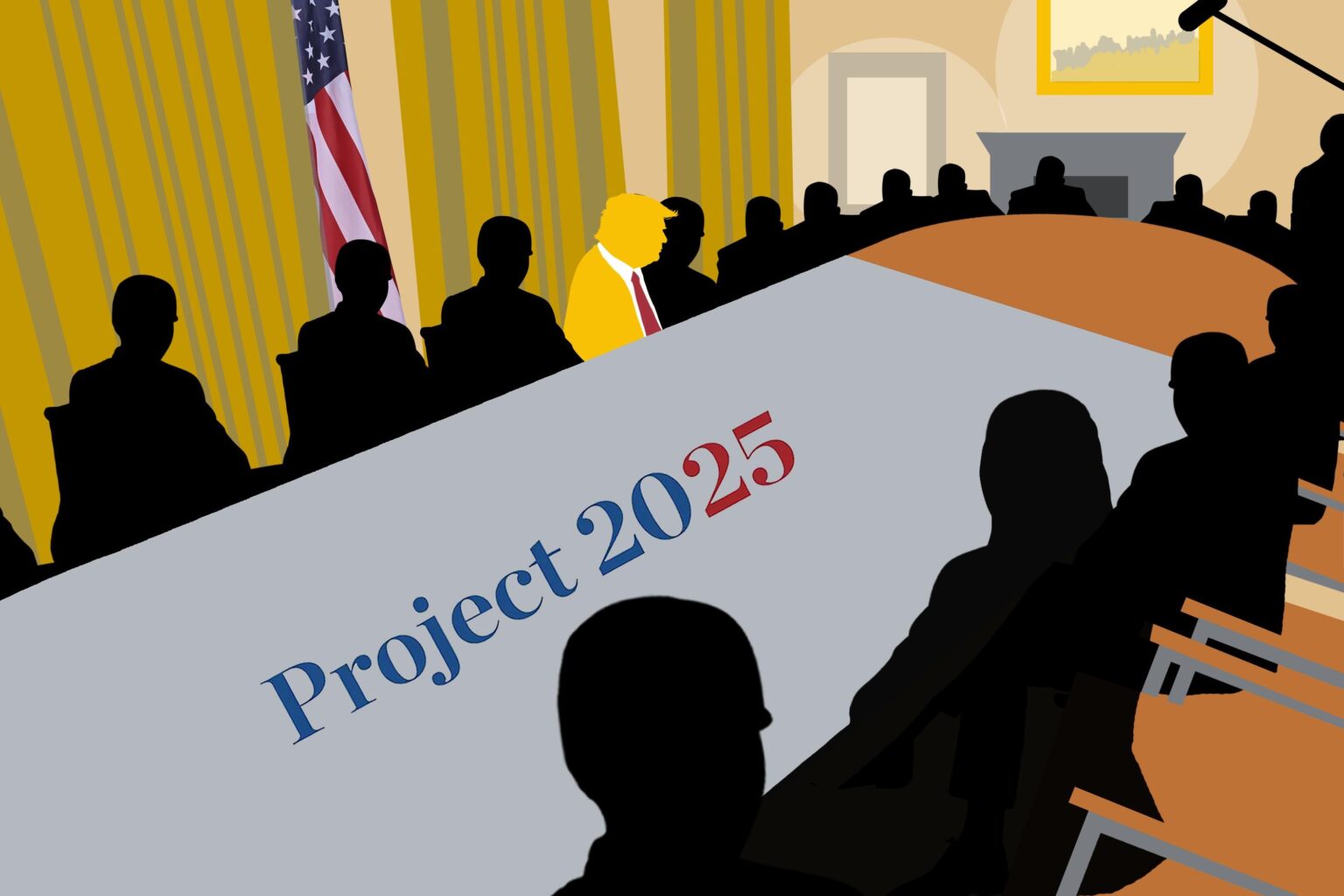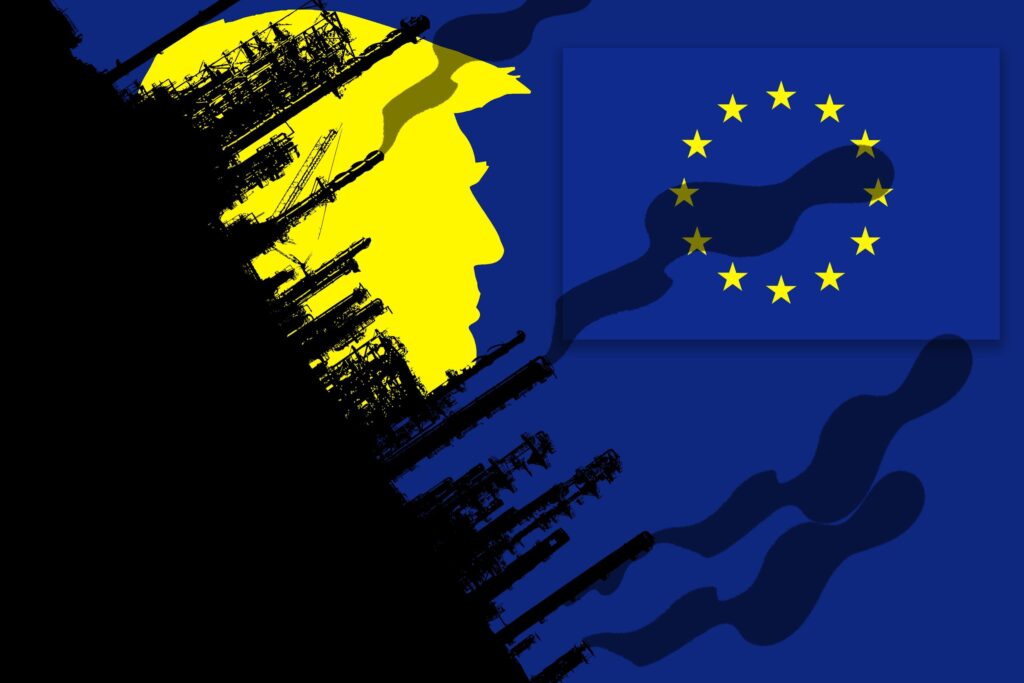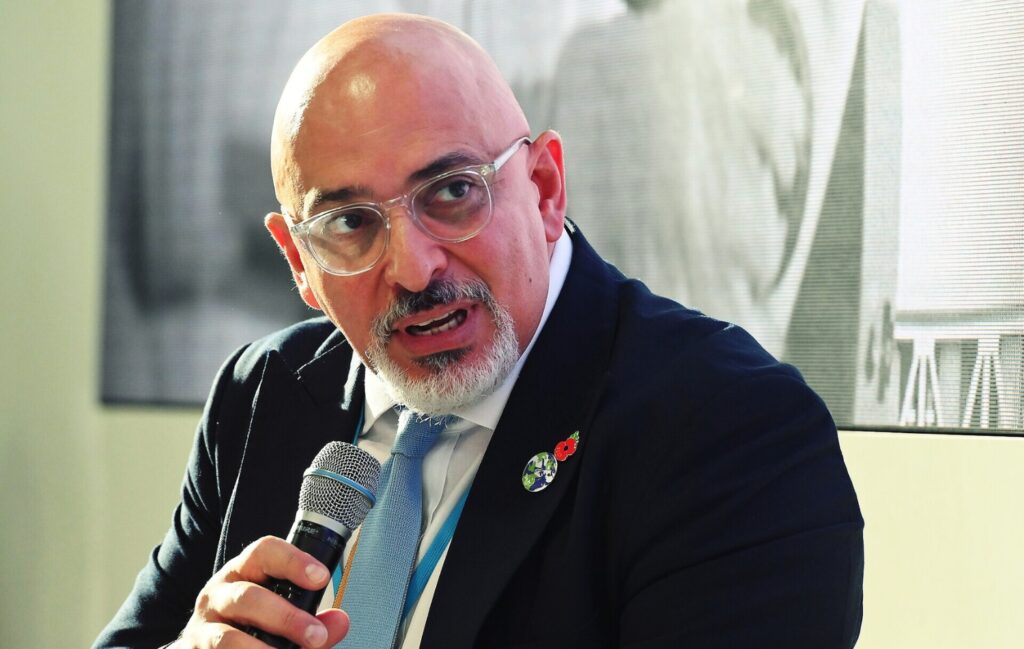Project 2025 has captured the U.S. government.
More than 50 high-level Trump administration officials have links to groups behind the Heritage Foundation-backed plan, a DeSmog analysis found. That number includes many of President Trump’s closest advisors, from Stephen Miller to the recently departing Elon Musk. It also includes a full 70 percent of his cabinet.
Some of the officials directly authored parts of “The Mandate for Leadership,” the now-notorious, 900-page proposal to “dismantle the administrative state” — the meat of Project 2025. Others recently worked for, donated to, or otherwise collaborated with one or more of the dozens of conservative groups that created the distinctly Christian Nationalist-flavored document. Some of these high-ranking officials have connections to five or more different Project 2025 groups, DeSmog’s analysis found.
In other words, Project 2025 isn’t just influential in Washington. Its friends and creators are literally running the show. Which helps to explain why the Trump administration has worked swiftly to implement the vision described in the “Mandate.”
From across-the-board tariffs to the mass firing of tens of thousands of federal workers to attacking inclusive language and initiatives, from gutting whole agencies and departments to dramatically stepping up the rate of deportations to the broad-scale rollback of environmental regulations and initiatives, a clear pattern has emerged: If the Trump administration’s doing it, Project 2025 probably spelled it out first.
It’s a stunning display of support for a widely unpopular set of ideas. In late September, just before the election, NBC News found that distaste for Project 2025 was one of the few things Americans agreed on; just four percent of Americans approved of the initiative. Though Trump vigorously and repeatedly disavowed Project 2025 on the campaign trail and today, and media outlets helped to cement the perception that he had turned his back on the Heritage Foundation and its allies, he went on to install its architects and allies in top posts across the government.
Subscribe to our newsletter
Stay up to date with DeSmog news and alerts
“As President Trump has said many times, he had nothing to do with Project 2025,” White House spokesperson Harrison Fields told DeSmog. (Fields was previously Assistant Director of Media and Public Relations at the Heritage Foundation.)
DeSmog’s analysis of these ties, which have not been previously reported in this level of detail, shows with new clarity how misleading Trump’s denials really were.
Topping the list, DeSmog concluded that 17 of 24 cabinet-level officials have ties to the groups behind Project 2025.
“That’s a hugely significant finding,” said Nancy MacLean, a history and public policy professor at Duke University, when DeSmog shared key details from this investigation in an interview. MacLean’s 2017 book Democracy in Chains charts how a cluster of right-wing groups (including the Heritage Foundation), many of which are backed by the billionaire fossil fuel–linked Koch network, worked for decades to impose their vision for American governance.
“In Heritage’s own longtime language, ‘personnel is policy,’” MacLean added. “It shows the incredible bad faith of Trump’s denials, because this is who he stocked his administration with.”
Among Trump’s appointees, DeSmog found three additional centers of influence that would at first appear separate from Project 2025: Convention of States, a movement to implement Project 2025-like policy through permanent changes to the Constitution, tied to the Texas evangelical pastor and oil billionaire Tim Dunn; The America First Policy Institute (AFPI), a pro-Trump think tank; and the Department of Government Efficiency (DOGE), a supposed cost-cutting exercise overseen until recently by tech billionaire and Trump megadonor Elon Musk.
All three turn out, on closer inspection, to have their own deep financial and operational ties to the groups behind Project 2025. For instance, Musk was secretly funding Project 2025’s architects more than two years before the 2024 election, as new DeSmog reporting makes clear.
RELATED: Elon Musk’s Government Legacy Was Enacting Project 2025. His Ties Go Back Years.
This complex, subterranean network of relationships has given the administration a veneer of plausible deniability, making it hard to connect administrative actions directly to a plan voters said they despised. And still dislike. Around 100 days into Trump’s second term, several polls show more than half of Americans disapprove of his signature, tear-it-to-the-ground-style policies, which often mirror Project 2025. But the close connections between top officials and Project 2025 groups helps to explain that they tend to be different faces of the same effort.
This undertaking is not new. As DeSmog has previously reported, Project 2025 advisory groups are heavily funded by fossil fuel magnates and a handful of industrialist family fortunes. Many of the groups themselves have a long-standing history of fighting to overturn regulations and consumer protections on behalf of industry — with climate policy specifically in their crosshairs.
What is new is that they’re no longer fighting from the outside. Their people now run the executive branch.
“What is new and quite dramatic is how quickly these different groups and networks have been able to coalesce and come together in a national framework where now there is direct authority and influence within Washington — an ability to truly shape policy in every facet of American life,” said Darren Dochuk, professor of history at the University of Notre Dame and author of Anointed with Oil: How Christianity and Crude Remade America.
“That is new. It’s stunning. I don’t think any historian of the religious right could have predicted just how swiftly these types of individuals would come to power, and the degree to which a president would lean heavily on them.”
Credit: Joe Fassler
Center of Influence #1: Project 2025
In April 2022, then-former President Trump took a 45-minute private flight with Heritage Foundation president Kevin D. Roberts to a Heritage dinner in Florida. There, Trump gave a keynote speech praising the organization. “They’re going to lay the groundwork and detail plans for exactly what our movement will do,” he said.
A year later, Heritage made good on that promise, publishing the 920-page Project 2025 “Mandate for Leadership”on its website. Fifty-three groups were listed as formal members of its advisory board, including 13 that are listed in DeSmog’s Climate Disinformation Database. After winning the 2024 election, Trump would go on to install those groups’ leaders and affiliates at the highest levels of government.
Vice President JD Vance has ties to at least five different Project 2025 groups, DeSmog’s analysis found. Vance was one of the earliest public figures to describe a plan for a Project 2025-like overhaul of the U.S. government, which he began discussing long before his successful run for Senate in 2023. “We should just seize the administrative state for own purposes,” he said on a 2021 podcast. “Fire every single mid-level bureaucrat. Fire every civil servant in the administrative state. Replace them with our people.”
Those comments foreshadowed Roberts’ own remarks when Heritage revealed the Project 2025 “Mandate for Leadership” blueprint in April 2023. Both Roberts and Vance have spoken publicly about their personal friendship; Roberts has called him “a great friend of mine and of Heritage.” Vance co-wrote a 2023 op-ed in The Hill with Roberts. He even wrote the foreword to Roberts’ book Dawn’s Early Light, scheduled for release in 2024 — though it became so controversial during election season that its publication was postponed.
Vance’s connection to Heritage dates back to 2017, when he wrote the introduction to an annual Heritage white paper and keynoted the paper’s public release. Since then, he’s gone on to speak at multiple Heritage events and panels, including introducing a film screening at the Foundation this spring.
Vance also served on the board of American Moment, a nationalist-populist Project 2025 advisory group focused on training a legion of young conservative staffers, which was reportedly integral to the conception and development of the “Mandate.” And he participated in multiple events and podcasts with American Compass, a nonprofit led by the anti-offshoring economist Oren Cass, who has repeatedly downplayed the threats of climate change and personally contributed to the “Mandate.” Vance blurbed Cass’s book in 2018, calling it “brilliant” and “among the most important [books] I’ve ever read.”
The current Vice President is also reportedly a member of the Teneo Network, a Project 2025 advisory group that convenes conservative thought leaders and is linked to the climate-denying donor-activist and Federalist Society co-chairman Leonard A. Leo. And Vance formally endorsed Tim Dunn’s Convention of States Project, according to that organization’s website.
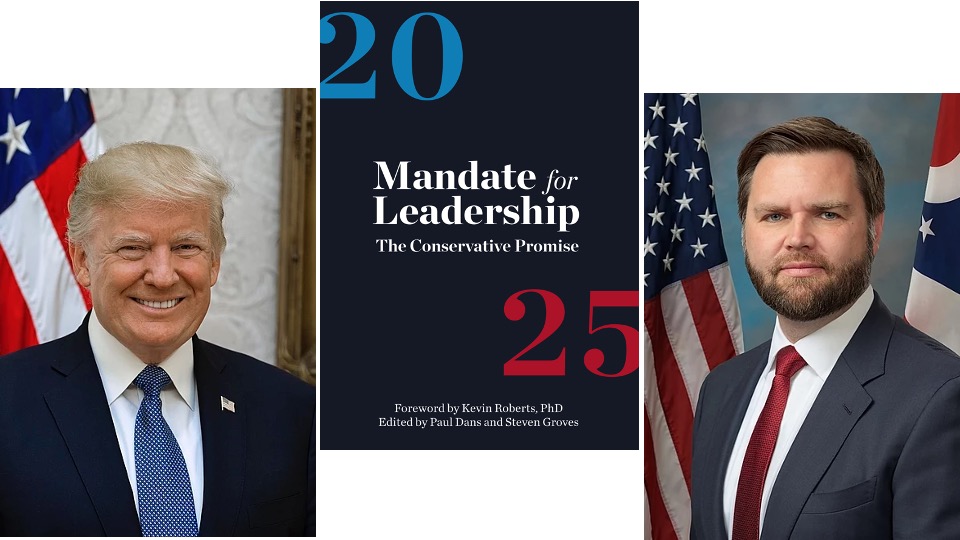
Office of Management and Budget (OMB) Director Russell Vought, reportedly a key architect of and driving force behind Project 2025, has ties to at least five Project 2025 nonprofits. His most obvious connection was authoring the “Mandate’s” central chapter on executive power, which outlined how a commander-in-chief could use OMB to “break the bureaucracy to presidential will,” a vision he’s pursued with incredible speed and ferocity since Trump’s first day back in office.
Before that, Vought founded his own nonprofit, the Center for Renewing America, which signed on as an advisory group. He also served as the Treasurer of America First Legal, a Project 2025 advisory group founded by Trump advisor — and current deputy chief of staff — Stephen Miller. Both those groups received start-up funding and administrative support from the Project 2025 advisor Conservative Partnership Institute (CPI), a Washington think tank that spawns other conservative think tanks. CPI — where Convention of States’ Tim Dunn is a major donor, according to The Washington Post — donated $1,940,701 to Center for Renewing America and $1,374,403 to America First Legal between 2021 and 2023, public disclosures show.
Vought also served as OMB Director during the first Trump administration, where he met with Dunn at his office at least once in 2019, according to his public calendar. After leaving office in 2020, Vought told NPR he was frustrated that career federal employees kept telling him that things he wanted to do were “illegal.” He had previously been a vice president at Heritage Action, the Heritage Foundation’s political arm.
Secretary of State Marco Rubio is linked to at least four Project 2025 groups. The Heritage Foundation has featured him as a speaker at least five times since 2018, and as a Senator he hired staffers, including his former chief of staff, from Heritage Action, the group’s political arm. That chief of staff, Michael Needham, would go on to chair American Compass. Like Vance, Rubio contributed to The New Conservatives, a forthcoming essay collection edited by American Compass’s Oren Cass.
The American Legislative Exchange Council (ALEC), a Project 2025 group known for supplying industry-friendly legislative blueprints to lawmakers, notes Rubio as an alumni. And he has formally endorsed Convention of States, according to its website.
RELATED: Mapped: How 6 Billionaire Family Fortunes Fund Project 2025
Veterans Affairs Secretary Doug Collins, who represented Georgia’s 9th district in the U.S. Congress between 2013 and 2021, is tied to at least three Project 2025 groups. In addition to being an ALEC alum, he has been a featured speaker at the Heritage Foundation. He’s also routinely featured speakers from the Competitive Enterprise Institute (CEI) — a Project 2025 group with a free-market focus, financial ties to the fossil fuel industry, and a long history of climate change denial — on his personal podcast. In 2010, he signed the CEI-sponsored “No Climate Tax” pledge to “oppose any legislation relating to climate change that includes a net increase in government revenue.”
Two Cabinet officials have ties to at least two Project 2025 groups: Homeland Security Director Kristi Noem and Secretary of Housing and Urban Development (HUD) Scott Turner. Noem was listed as an ALEC alum during her time as Governor of South Dakota, and she also has been a featured speaker at the Heritage Foundation. Turner was a board member at American Cornerstone Institute, a CPI-funded Project 2025 group founded by Trump’s first HUD Secretary, former presidential candidate Ben Carson. Turner is also an ALEC alum.
Eight other Cabinet officials have ties to at least one Project 2025 group. Four of these have ties to the Heritage Foundation, including Treasury Secretary Scott Bessent, who was listed as a “Founding Donor” to the organization in 2023; Transportation Secretary Sean Duffy, who has been a featured Heritage speaker and sent at least one staffer to the Heritage Congressional Fellows training program during his time on Capitol Hill; and Director of National Intelligence Tulsi Gabbard, who promoted her 2024 book on Kevin Roberts’ Heritage-backed YouTube show.
Center of Influence #2: Tim Dunn and Convention of States
Long before he became a key player in Project 2025’s network of think tanks, Tim Dunn was a Texas powerhouse. As the bold, bible-thumping CEO of Crownquest Operating, he made a fortune fracking the Permian oilfield of West Texas — and deployed his wealth and influence behind a handful of state-level groups pushing for Christian Nationalist values and small-government policy.
But by 2008, Dunn began to develop a greater interest in the national playing field, a shift prompted partly by the rise of then-President Barack Obama — whose administration, the oilman complained, was beginning to regulate oil and gas production more aggressively on environmental grounds.
“If energy decisions are made by a handful of ‘experts’ we will get what every other country who has ever adopted central planning gets: tyranny and poverty,” Dunn wrote, in a 2012 blog post. His vision was to restore what he called a “heritage of self-governance” — a free-market vision that conflated limitless corporate power with community sovereignty.
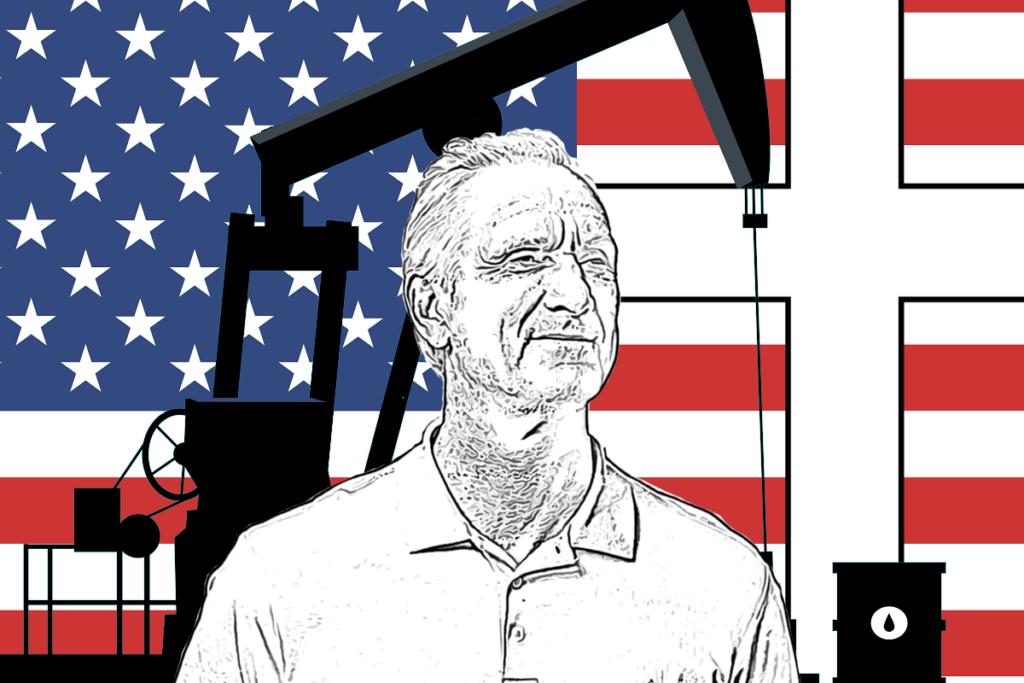
It was a theme OMB Director Russell Vought would go on to echo, years later, in his chapter of the Project 2025 “Mandate for Leadership”: “Nothing less than the survival of self-governance in America is at stake.”
In 2010, Dunn founded the nonprofit Citizens for Self-Governance (CSG) with activist Mark Meckler, who the year prior co-founded the Tea Party Patriots (TPP). (TPP, which organized nationwide events to protest Obama’s agenda and was later revealed to be a Koch-linked astroturfing effort, would eventually become a Project 2025 advisory group in 2023.)
At first, Citizens for Self-Governance was mostly focused on driving Republican members of Congress to the right by encouraging primary challenges to those deemed not conservative enough.
But in 2013, with Dunn’s help, CSG launched a new, much more radical initiative: Convention of States (CoS). Like its ideological counterpart, the Heritage Foundation, CoS sought to dramatically shrink the size of the federal government while overturning “growth-killing” regulations.
Except it wanted to go even further. According to one CoS handbook, the goal is to develop a “solution that will let us go around the Washington political establishment and rein in the out-of-control federal government, permanently.”
This means calling an Article V convention, an unprecedented step that requires two-thirds of state legislatures, or 34 states, to pass a law calling for one. Since its inception, CoS has worked with the American Legislative Exchange Council — an industry-funded Project 2025 advisory group that acts as a corporate bill mill, supplying conservative lawmakers with draft legislation and messaging strategies — to introduce its resolutions, according to MacLean’s Democracy in Chains.
It’s been a successful strategy. CoS has already worked to pass Article V resolutions in 18 states; others have legislation in progress. The Convention would then propose constitutional amendments that 38 states would need to ratify. Such a process, once initiated, would have few, if any, guardrails.
As MacLean writes:
Should enough state legislatures sign on to invoke Article V, there is actually nothing the rest of us can do to stop the process from going forward short of, frankly, revolution. Or as Mark Meckler gloats: once the advocates get to thirty-four authorizations, “Congress can’t stop us. The President “can’t stop us. SCOTUS can’t stop us.” Nor can the American people.
Four cabinet members have endorsed Convention of States: In addition to Vance and Rubio, Department of Defense Secretary Pete Hegseth and Agriculture Secretary Brooke Rollins given their support, according to the CoS website. White House Press Secretary Karoline Leavitt has also endorsed it, as has former presidential candidate and biotech billionaire Vivek Ramaswamy, who was initially tapped to run DOGE with Musk.
Musk, who reportedly worked to push Ramaswamy out of DOGE even before Trump was inaugurated, hasn’t himself promoted the CoS effort. Not that Dunn and his colleagues aren’t trying. In February, the Convention of States Foundation paid to blanket the area surrounding Musk’s Austin, Texas–based Tesla factory with billboards asking him to sign on.
“Elon, want to cut government permanently?” one read, next to an image of Musk wielding a chainsaw. Hired trucks flashed the same slogan as they roved nearby streets, with their large screens featuring an additional, telling line: “DOGE = Convention of States.”
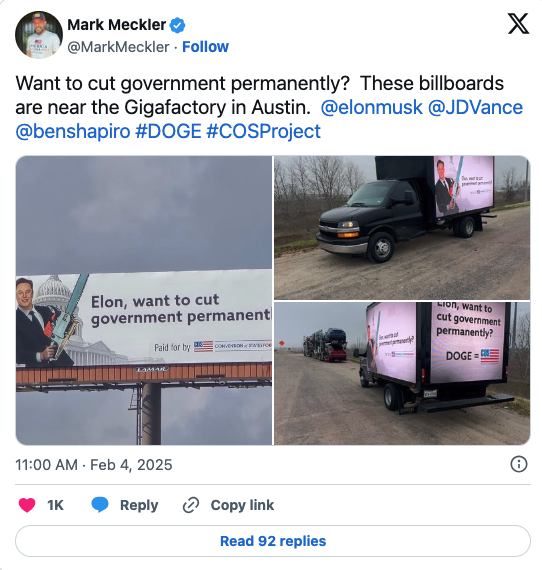
More recently, CoS has penned an open letter to Musk asking that he endorse the effort, claiming to have gathered at least 10,000 signatures so far.
Convention of States mostly flew under the radar during the 2024 election season, in part because it had not initially signed onto Project 2025. But by that October, the Heritage-led effort included CoS among its advisory council.
But that was not the extent of its participation. CoS also directly funded at least four other Project 2025 groups between 2021 and 2023, according to public financial filings DeSmog reviewed. That includes $40,000 to the Texas Public Policy Foundation and $20,000 to America First Legal, the group founded by Deputy Chief of Staff Stephen Miller and where OMB Chief Russ Vought served as Treasurer.
Dunn is also reportedly “a major funder” of the Conservative Partnership Institute (CPI), a major player in the genesis of Project 2025, according to The New Yorker. On its website, CPI says it provided “administrative, staffing, and legal support” for at least seven Project 2025 groups: Miller’s America First Legal, Vought’s Center for Renewing America, American Cornerstone Institute, American Moment, American Accountability Foundation, the Election Integrity Network, and Personnel Policy Operations (PPO). Dunn has poured more than $3 million into PPO’s Courage Under Fire Legal Defense Fund, an initiative providing legal aid to former Trump administration officials accused of crimes while in office, according to the Washington Post.
But Dunn’s closest ties to the cabinet are arguably through an influential group that tried to avoid any direct association with Project 2025: The America First Policy Institute (AFPI).
Center of Influence #3: America First Policy Institute
Shortly after Trump’s 2020 election defeat, Brooke Rollins and Linda McMahon — both Trump officials leaving the first administration — started a new nonprofit that sought to shape the agenda for a second Trump term.
“The America First Policy Institute is launching to continue the transformative changes that happened over the past four years,” Rollins said in a promotional video announcing the group’s formation. “We keep the mission going.”
Rollins, AFPI’s President and CEO, cast its emphasis on slashing regulations and shrinking federal government as wresting power away from “elites” and returning it to “we the people” — framing that would become a major, recurring theme of Project 2025.
In the years that followed its founding, AFPI would indeed become a powerhouse in the second Trump administration. Eight cabinet officials, including Education Secretary McMahon and Agriculture Secretary Rollins, had staff or board roles at the new nonprofit: Attorney General Pam Bondi chaired its Center for Litigation; Environmental Protection Agency (EPA) Administrator Lee Zeldin led its “Pathway to 2025” voter drive; National Economic Council Director Kevin Hassett served on its board in 2023; Veterans Affairs Secretary Doug Collins chaired its Georgia chapter; and Housing and Urban Development Secretary Scott Turner chaired its Center for Education Opportunity. A ninth member of the Cabinet, Homeland Security Secretary Kristi Noem gave a keynote address to the group in 2023. The daughter of a tenth member of the Cabinet, Chief of Staff Susie Wiles, worked there as a regional policy coordinator.
Before the 2024 election, AFPI was widely regarded as a “White House in waiting,” the leading source for future roles within a second Trump administration. In that sense, it was routinely framed as competing with Project 2025 — though its own policy proposal, the “America First Agenda,” had deep similarities with the “Mandate.” In a 2024 op-ed for the New York Times, one media pundit described AFPI as being in a “shadow war” for influence with the Heritage Foundation.
But this framing overlooked how deeply entangled AFPI leadership was with groups that supported Project 2025 more directly. To understand that dynamic, it helps to examine the history of one such group in particular: the Texas Public Policy Foundation (TPPF), a small-government think tank, which includes attacking renewable energy policies and boosting fossil fuels among its various efforts.
At least five staffers from TPPF contributed to Project 2025’s flagship document, and it was a charter member of Project 2025’s advisory board. The think tank has a lengthy history of climate crisis denial, and of longstanding ties to industry, including donations from the billionaire industrialist Koch family empire. Longtime Austin activist Craig MacDonald has called its donor base “a Who’s Who of Texas polluters, giant utilities and big insurance companies.”
Key among them: Tim Dunn.
The Texas oilman-turned-politicker has served on TPPF’s board of directors since at least 2001, according to DeSmog’s review of public financial filings. And in 2003, with Dunn on its board, TPPF hired Rollins — who would later lead AFPI, and then the Department of Agriculture — as its president and CEO.
At the time, Rollins was best known as policy director for then Texas Governor Rick Perry. During her time at TPPF, she became one of the 25 most powerful people in Texas, according to a 2011 roundup by Texas Monthly. In 2016, she hired Kevin D. Roberts, then the president of an obscure Catholic college in Wyoming, as TPPF’s executive vice president. When Rollins left the organization in 2018 to join the first Trump administration, Roberts took the reins. From there, he would go on to lead the Heritage Foundation and become a “mastermind” behind Project 2025 — though he remains on TPPF’s board to this day.
On April 14, 2021, shortly after Joe Biden took office as President, Rollins rejoined TPPF as a senior advisor on its board. In a press release announcing her return, Rollins said that her work for the organization had been “one of the greatest achievements of her life,” and specifically thanked Dunn and Roberts.
But Rollins also had other things on her mind. That same day — April 14 — Axios reported that she had been named president and CEO of a new nonprofit, America First Policy Institute, that would “fight to be a muscular, well-heeled center of the future of conservatism.” Rollins would be joined by McMahon, then best known as a billionaire World Wrestling Entertainment (WWE) mogul and Trump donor, who would serve as board chair.
What Axios didn’t report was that the new organization shared TPPF’s close ties to Tim Dunn. Dunn was the first person that Rollins and McMahon approached about starting the nonprofit, according to the New York Times, which did not note his Project 2025 connections. Rollins’ official bio for the new organization suggested that the goal was to reproduce Texas Public Policy Foundation’s state-level successes on the national stage, calling TPPF “the model and inspiration for AFPI.”
“Dunn’s Texas-based organizations have clearly shaped the politics of the state there,” Notre Dame historian Dochuk said. “It’s clearly the foundation on which he built what has now become a national movement.”
Dunn joined the board of AFPI, where he shared board seats with Rollins and McMahon from the organization’s inception until their departure for the White House. He also joined the board of America First Works, AFPI’s political action arm, where he and McMahon overlapped from 2021 to 2023 and Rollins and future EPA chief Lee Zeldin overlapped in 2023. Dunn’s presence meant a major player in the Project 2025 network also took a leading role at AFPI, yet his participation went virtually unnoticed in the election lead-up.
At the same time, yet another organization would also provide a through-line between AFPI, the Heritage Foundation, and Dunn: the Texas Public Policy Foundation. From the day the world learned Rollins was leading AFPI until she returned to government as Agriculture Secretary, she would continue to sit on TPPF’s board with Dunn and Roberts. There, Rollins was helping to advise the organization as it played a key role in working on Project 2025, even as AFPI stood seemingly at a distance from that effort. A shadow war this was not.
It wasn’t just board-level coordination. Under Rollins and McMahon, AFPI directly partnered with Project 2025 groups all the time.
In 2023, AFPI joined with TPPF, Heritage Action (the Heritage Foundation’s lobbying arm), and the Competitive Enterprise Institute, another Project 2025 advisory group, to advocate for reversing Biden-era, climate-oriented changes to the National Environmental Policy Act — also a theme of Project 2025’s flagship document.
AFPI also enlisted numerous Project 2025 advisory groups in a wide-ranging, get-out-the-vote effort overseen by Zeldin. In a partial list published in a 2024 impact statement, AFPI thanked partner organizations including Miller and Vought’s America First Legal, TPPF, Turning Point USA, Family Research Council, AMAC Action, and other official co-sponsors of the Heritage-backed effort. (In June 2024, Stephen Miller requested that Heritage remove America First Legal from Project 2025’s advisory council, denying involvement despite several AFL staffers directly contributing and calling out the organization by name in the “Mandate.”)
Between 2020 and 2023, AFPI and its advocacy arm donated more than $6.5 million directly to groups aligned with Project 2025 as well, including over $4 million to Leonard Leo’s Honest Elections Project and almost $1 million to Heritage Action, DeSmog’s analysis found — including a $250,000 donation to Convention of States.
And AFPI and America First Works also both signed on to the Only Citizens Vote Coalition, an initiative pushing false narratives about voting fraud run by the Project 2025 group Election Integrity Network, which was itself a product of the Dunn-linked Conservative Partnership Institute, another Project 2025 group.
It’s a dizzying array of different conservative nonprofits, but entities in this ecosystem tend to be “very, very similar,” said Duke’s Nancy MacLean. “Many of them have the same funders and overlapping personnel and people who go from one to the other,” she said. “This is a very well-integrated network of ostensibly separate organizations, organizations that share the same donors very often, and share the same core mission and purpose and agenda.”
RELATED: 6 Billionaire Fortunes Bankrolling Project 2025
DeSmog found numerous additional ties between other high-level appointees and AFPI, CoS, and Project 2025 as well. For instance, CIA Director John Ratcliffe, who co-chaired AFPI’s Center for American Security, is also listed as a contributor to the Project 2025 “Mandate for Leadership” document. National Economic Council Director Kevin Hassett, who formerly served as an AFPI chair, has been a featured speaker at multiple Heritage events. And Federal Bureau of Investigation (FBI) Director Kash Patel was a senior fellow at both AFPI and Vought’s Center for Renewing America.
“He’s a visionary,” Rollins said of Dunn, in comments to the Wall Street Journal for a 2024 article that did not mention Convention of States or Dunn’s many other links to Project 2025. “His ability to build organizations and structure and culture is so incredible. I’ve relied on him more for that than his funding.”
Center of Influence #4: DOGE
The effort that has done the most to advance Project 2025’s goals is ostensibly the most independent from it: Elon Musk’s Department of Government Efficiency (DOGE). Since January, the eccentric billionaire — who was by far Trump’s largest donor by dollars, but who also used an entire social media platform, X, to help swing the election toward him — had been taking a chainsaw to federal agencies, often so haphazardly that he had occasionally been forced to rehire newly fired employees. (The White House recently announced Musk’s own exit.)
Today, media narratives typically paint DOGE as wholly separate from Project 2025, despite the shared goals of drastically reducing government’s size, cutting regulations, and punishing initiatives referencing systemic injustice or using inclusive language.
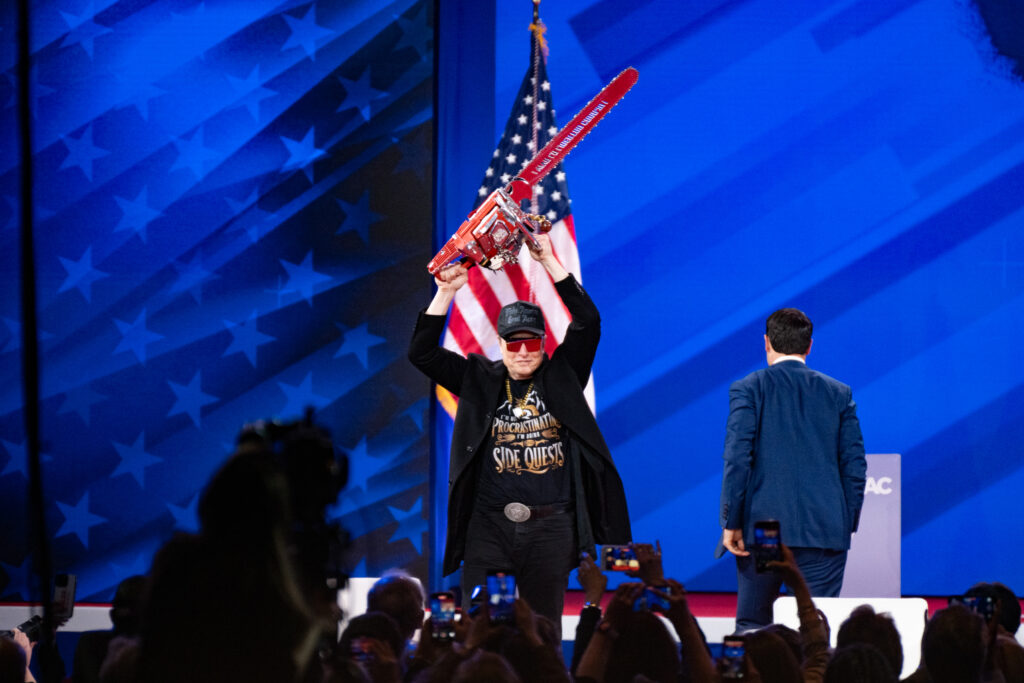
But Musk, who Trump says is “really not leaving” DOGE for good, can’t really be separated from the Project 2025 effort. In fact, he has given one of the largest single donations to any of its backers: at least $43 million to a subsidiary of Stephen Miller’s America First Legal, secretly, in 2022. OMB chief Russ Vought — one of Project 2025’s chief architects, also a former Heritage staffer — was then America First Legal’s Treasurer. As a related DeSmog investigation makes clear, that massive secret donation directly connects Project 2025 and DOGE before either initiative was made public. In the immediate aftermath of the 2024 election, however, the Miller/Vought/Musk bromance — long in the shadows — finally took center stage.
On the night of November 14, AFPI held its gala at Mar-a-Lago, using it as an opportunity to introduce the incoming president’s first Cabinet picks; all the members of Trump’s inner circle were in town.
That week, according to The New York Times, Musk, Vought, and Miller had a series of highly productive meetings at Trump’s beach club, discussing how to severely shrink the government. Musk was so impressed by Vought — specifically by how radical he was willing to be — that Trump ended up choosing him for OMB Director a second time, despite a supposed “ban” on any incoming officials linked to Project 2025. That ban, of course, turned out to be laughable: more sitting cabinet members have links to Project 2025 than don’t.
Since then, DOGE has continued to collaborate with Vought’s OMB, including using personnel linked to Vought’s Center for Renewing America to carry out its work, as DeSmog’s new reporting makes clear. He and Musk both have help from American Moment’s founder, Saurabh Sharma, who the New Yorker reported was a “key node” in drafting Project 2025. Sharma is now a special assistant to the president at the White House Presidential Personnel Office, which helps to oversee staffing, and has been the messenger in many of the administration’s mass firings.
The close links between Project 2025, AFPI, and DOGE continue to be poorly understood, and mainstream media has missed the central role of Tim Dunn and Convention of States almost entirely. Instead, as the second Trump administration rushed to confirm its nominees to the most powerful positions in government, some media outlets praised his cabinet picks for an unlikely virtue: diversity.
In November, the Associated Press hailed the incoming Trump Cabinet for its “wide breadth of ideological diversity,” suggesting the President’s picks featured plenty of strange bedfellows and plenty of “clashing opinions on priorities.” In December, Wall Street Journal editor-at-large Gerard Baker called Trump’s Cabinet “the convening of a broad church that reflects the dynamic pluralism of America,” a group with “all the efficiency and unity of a first grade field trip.” And in January, New York Times reporter David E. Sanger wrote that the appearance of lockstep MAGA loyalty was only a “veneer” — that the new officials displayed a surprising “range of experiences and worldviews” about how to govern.
But that diversity was always an illusion. The sheer number of connections to Project 2025 in the cabinet and throughout the administration show broad alignment with that initiative’s vision and goals. And Trump’s appointees have acted with the kind of speed and relentlessness that only a team of like-minded allies — say, a good 70 percent of the Cabinet — can muster.
In an April interview with NPR, one in which he praised the administration’s efforts on everything from tariffs to El Salvador private prison deportations, and specifically called DOGE “wonderful,” Heritage’s Kevin Roberts didn’t sound much like an outside observer with meaningful differences of opinion. He didn’t sound like a movement leader governing an unruly and disparate conservative coalition. About halfway through the interview, he uttered four words that more or less sum his take on how things are going: “so far, so good.”
The America First Policy Institute, Convention of States, The Heritage Foundation, the Texas Public Policy Foundation, American Moment, and the Conservative Partnership Institute had not responded to requests for comment by press time.
Requests for comment sent to the departments and agencies overseen by members of the cabinet had also not been answered by press time.
Subscribe to our newsletter
Stay up to date with DeSmog news and alerts


